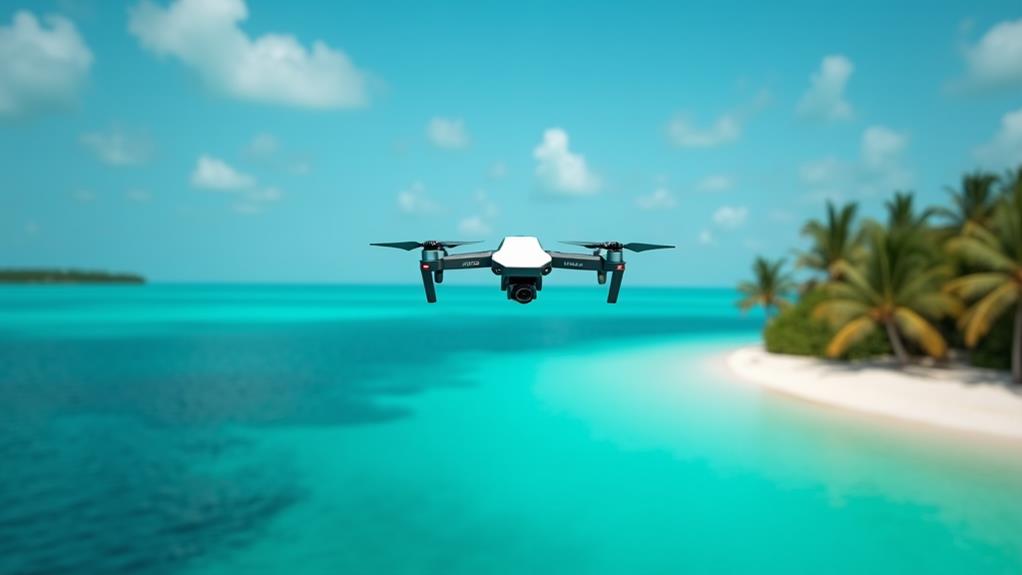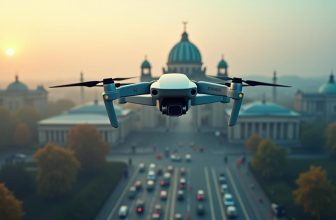
You plan to capture stunning aerial footage in the Bahamas, but you also need to know the rules. Flying a drone safely means flying responsibly, and that starts with understanding the regulations. As you prepare to take to the skies, you'll need to navigate the top 5 drone laws that govern the use of unmanned aerial vehicles in the Bahamas. But what exactly do these laws entail, and how will they impact your drone operations? From registration requirements to no-fly zones, let's break down the essential regulations you need to know.
Contents [hide]
Key Takeaways
- Drone registration is required in the Bahamas if the drone weighs over 250 grams and is capable of flying.
- No-fly zones include areas around airports, military bases, and government facilities in the Bahamas.
- Drone operators must be at least 18 years old, or 16 with a pilot certification from a BCAA-approved training program.
- Operators must respect individuals' right to privacy, avoiding capturing images or footage without explicit consent.
- Liability coverage is required to protect against risks associated with drone usage, including third-party and personal injury coverage.
Recreational Drone Registration Requirements
If you're planning to fly a recreational drone, understanding the registration requirements is crucial to guarantee compliance with federal regulations.
In the Bahamas, the Civil Aviation Authority (CAA) oversees drone operations and sets the registration guidelines.
You must register your drone if it weighs more than 250 grams and is capable of flying.
To register, you'll need to provide your name, address, and contact information, as well as a unique identifier for your drone.
If you're a foreign national, you'll need to obtain a foreign registration from the CAA, which requires additional documentation, such as proof of citizenship and a valid address.
Drone fees vary depending on the type of registration you need.
A standard registration costs $25 per year, while a foreign registration costs $50 per year.
You'll also need to pay a one-time $10 fee for a unique drone identification number.
It's essential to note that registration is only valid for one year, and you'll need to renew it annually.
Failure to register your drone or renew your registration can result in fines and penalties.
No Fly Zones in the Bahamas
The Bahamas has designated specific areas as no-fly zones for drones, where operating a drone is strictly prohibited or heavily restricted.
These no-fly zones include areas around airports, such as the Nassau International Airport and the Freeport International Airport, due to airport restrictions that prioritize the safety of both passengers and aircraft.
You aren't allowed to fly a drone within a 3-nautical-mile radius of these airports, and you must also maintain a safe distance from the airport's runways and taxiways.
Additionally, areas with national security significance, such as military bases and government facilities, are also designated as no-fly zones.
You must avoid flying your drone over or near these areas to prevent any potential security breaches.
You can find information on these no-fly zones on the official website of the Bahamas' aviation authority or by consulting a map of the no-fly zones.
It's your responsibility to familiarize yourself with these restrictions before flying your drone in the Bahamas.
Failure to comply may result in penalties and fines.
Always check for updates on no-fly zones before flying your drone.
Drone Operator Age Restrictions
Operating a drone within designated no-fly zones in the Bahamas requires careful deliberation, but another factor to ponder is the age of the drone operator.
The Bahamas Civil Aviation Authority (BCAA) has established specific age restrictions for drone operators to guarantee safe and responsible drone operations. According to BCAA regulations, you must be at least 18 years old to operate a drone for recreational or commercial purposes.
However, if you're between 16 and 18 years old, you can still operate a drone, but you'll need to obtain a pilot certification from a BCAA-approved drone pilot training program.
Additionally, age exemptions may apply to certain individuals, such as students participating in educational programs or individuals with a disability.
To qualify for an age exemption, you'll need to provide supporting documentation, such as proof of enrollment in a drone training program or a medical certificate.
Before operating a drone in the Bahamas, it's crucial to familiarize yourself with the age restrictions and exemptions to avoid any potential fines or penalties.
Right to Privacy Regulations
Within designated airspace, the Bahamas Civil Aviation Authority (BCAA) requires drone operators to respect individuals' right to privacy by adhering to specific regulations.
You must guarantee that your drone operations don't infringe on people's personal boundaries or raise surveillance concerns. This means you can't capture images or footage of individuals in private areas without their explicit consent.
You're also prohibited from flying your drone over private properties, such as residential areas or commercial establishments, without permission from the property owners or occupants.
Additionally, you must avoid flying your drone in a way that could be perceived as invasive or harassing.
The BCAA emphasizes the importance of respecting individuals' right to privacy and expects drone operators to exercise caution and restraint when flying their drones.
You're encouraged to familiarize yourself with local laws and regulations regarding drone operations and to take steps to minimize the risk of infringing on people's personal boundaries.
Drone Insurance Requirements
Ensuring adequate insurance coverage is a critical aspect of responsible drone operation.
As a drone operator in the Bahamas, you must secure liability coverage to protect yourself and others from potential risks associated with drone usage.
This financial protection is essential in the event of accidents or damage to property.
- Third-Party Liability Coverage: You must obtain insurance that covers damages to third-party property, such as buildings, vehicles, or crops.
- Personal Injury Coverage: Your insurance policy must include coverage for personal injury to others, including passengers or bystanders.
- Drone Damage Coverage: You should also consider coverage for damage to your drone, including loss or theft.
- Professional Indemnity Coverage: If you operate a drone for commercial purposes, you may need professional indemnity coverage to protect yourself against claims of negligence or breach of contract.
Frequently Asked Questions
Can I Fly a Drone Over a Cruise Ship in Bahamian Waters?
When flying a drone over Bahamian waters near a cruise ship, you must prioritize cruise ship safety and respect passenger privacy. You'll need permission from the ship's captain or owner, and guarantee your drone doesn't pose a risk or intrude on passengers' private spaces.
Are Permits Required for Aerial Drone Photography Services?
You might worry that permits will hinder your aerial drone photography services, but don't let that stop you. You'll likely need to obtain aerial permits and demonstrate compliance with drone insurance requirements in the Bahamas.
Can I Import a Drone to the Bahamas for Personal Use?
You'll need to comply with Customs regulations when importing a drone to the Bahamas for personal use, and you may be required to pay duty fees, which can vary depending on the drone's value and classification.
Can I Operate a Drone Near Marine Protected Areas?
Treading on thin ice, you'll need to exercise caution. You're allowed to operate a drone near marine protected areas in the Bahamas, but must respect marine boundaries and avoid interfering with coastal surveillance operations.
Is Night-Time Drone Flying Allowed in the Bahamas?
When operating a drone in the Bahamas, you'll need a permit for night-time flights, as you'll be piloting under Dark Skies, but some restrictions may apply, limiting your Moonlight Flights to specific areas and altitudes.
Conclusion
Research suggests that strict drone regulations can substantially decrease accidents and increase public trust. As you now know the top 5 drone laws in the Bahamas, you're likely to wonder if these regulations effectively reduce risks. Evidence supports this theory, as countries with similar regulations have reported lower incident rates. By adhering to these laws, drone operators in the Bahamas can contribute to a safer and more responsible drone environment.






